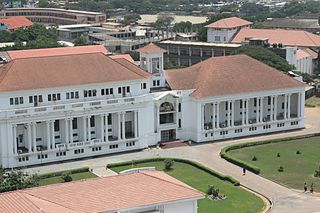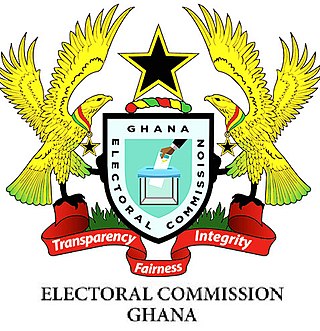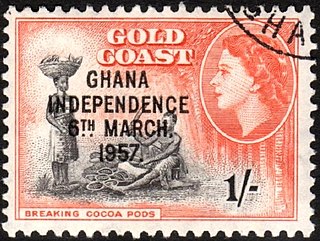Related Research Articles

Politics of Ghana takes place in a framework of a presidential representative democratic republic, whereby the president of Ghana is both head of state and head of government, and of a two party system. The seat of government is at Golden Jubilee House. Executive power is exercised by the government. Legislative power is vested in both the government and Parliament. The judiciary is independent of the executive and the legislature.

The Government of Ghana was created as a parliamentary democracy, followed by alternating military and civilian governments in Ghana. In January 1993, military government gave way to the Fourth Republic after presidential and parliamentary elections in late 1992. The 1992 constitution divides powers among a president, parliament, cabinet, council of state, and an independent judiciary. The government is elected by universal suffrage.

The New Patriotic Party (NPP) is a centre-right and liberal-conservative political party in Ghana. Since the democratisation of Ghana in 1992, it has been one of the two dominant parties in Ghanaian politics, with its leading rival being the centre-left National Democratic Congress (NDC). John Kufuor of the NPP was President of Ghana from 2001 to 2009. At the elections held on 7 December 2004, the party won 129 out of 230 seats. The NPP candidate was Kufuor, who was re-elected as president with 52.75% of the vote. The New Patriotic Party symbol is the African elephant and the New Patriotic Party colours are red, white, and blue.

The National Democratic Congress (NDC) is a social democratic political party in Ghana, founded by Jerry Rawlings, who was Head of State of Ghana from 1981 to 1993 and the President of Ghana from 1993 to 2001. Following the formation of the Provisional National Defence Council (PNDC), which ruled Ghana following the military coup d'état on 31 December 1981, there was pressure from the international community to restore democracy. The NDC was formed as the ruling party ahead of elections in 1992, in which Rawlings was elected president, and in 1996 Rawlings was re-elected as the NDC candidate. Rawlings' second term ended in 2001.

The Supreme Court of Ghana is the highest judicial body in Ghana. Ghana's 1992 constitution guarantees the independence and separation of the Judiciary from the Legislative and the Executive arms of government.
Alhaji Imoru Egala was a Ghanaian politician and educationist. He held various positions in government in the Gold Coast and after independence of Ghana. He was the foreign minister of Ghana in the First Republic between 1960 and 1961.

The Electoral Commission of Ghana (EC) is the official body in Ghana responsible for all public elections. Made up of seven members, its independence is guaranteed by the 1992 Ghana constitution. The current commission was established by the Electoral Commission Act (Act 451) of 1993. Kwadwo Afari-Gyan was the first substantive chairman of the commission, from 1993 to 2015. He was succeeded by Charlotte Osei as the first female chairman of the commission from 2015 to June 2018. Jean Adukwei Mensah succeeded Charlotte Osei in July 2018. On December 5, 2018, the Electoral commission chaired by Jean Adukwei Mensah reverted to the old logo showing the Coat of arms of Ghana and a ballot box showing the hand casting its votes, after the controversy over the new logo.

The Constitution of Ghana is the supreme law of the Republic of Ghana. It was approved on 28 April 1992 through a national referendum after 92% support. It defines the fundamental political principles, establishing the structure, procedures, powers and duties of the government, structure of the judiciary and legislature, and spells out the fundamental rights and duties of citizens. It is made up of 26 chapters, not including the preamble.

General elections were held in Ghana on Friday 7 December 2012 to elect a president and members of Parliament in 275 electoral constituencies. Owing to the breakdown of some biometric verification machines, some voters could not vote, and voting was extended to Saturday 8 December 2012. A run-off was scheduled for 28 December 2012 if no presidential candidate received an absolute majority of 50% plus one vote. Competing for presidency were incumbent president John Dramani Mahama of the National Democratic Congress (NDC), his main challenger Nana Akufo-Addo of the New Patriotic Party (NPP) and six other candidates.

Ghana gained independence from the British on 6 March 1957. It is a member of the Commonwealth of Nations. The country became a republic on July 1, 1960.
The National Commission for Civic Education (NCCE) is a government agency in Ghana. The commission is responsible for the education of Ghanaians on civic matters. The commission was established by Act 452 of the Parliament of Ghana in 1993.
Kwabena Agyei Agyapong is Ghanaian civil engineer and politician.
Kwasi Anin-Yeboah is a Ghanaian judge and the immediate past Chief Justice of Ghana. In December 2019, President Nana Addo Dankwa Akufo-Addo nominated Justice Anin-Yeboah as the Chief Justice of Ghana.

Josiah Ofori Boateng. is a Ghanaian judge who served on the Supreme Court of Ghana from 1999 to 2001. He previously served as Chairman of the Interim Electoral Commission of Ghana from 1989 to 1993, and in this role presided over the conduct of the first general elections under Ghana's Fourth Republic.

The Political history of Ghana recounts the history of varying political systems that existed in Ghana during pre-colonial times, the colonial era and after independence. Pre-colonial Ghana was made up of several states and ethnic groups whose political system was categorized by 3 main administrative models; Centralized, Non-centralized and Theocratic states. In the colonial era, the British Empire employed different forms of government among its four territorial possessions in the Gold Coast. Indirect rule was implemented in the late 19th century after its success in Northern Nigeria. From the 1940s, native Ghanaians yearned for more autonomy. This resulted in the several constitutional reforms as well as the creation of the office of the Prime Minister in 1952.
Joseph Kwame Kingsley-Nyinah was a Ghanaian judge who served as a justice of the Court of Appeal and also as the Electoral Commissioner for Ghana.
References
- 1 2 3 4 "Afari-Gyan Profile". United Action against Corruption and Injustice. Archived from the original on 6 August 2010. Retrieved 20 June 2010.
- ↑ Asmah Kobby (June 2015). "Afari Gyan bids goodbye". Daily Graphic: 3.
- ↑ "The Commissioners". Electoral Commission of Ghana . Retrieved 20 June 2010.
- ↑ "American Chronicle - Electoral Commission and Afari Gyan deserve Nobel Peace Prize". americanchronicle.com.
- ↑ "Afari Gyan Fumes". Ghana Elections. MordernGhana.com. Retrieved 20 June 2010.
- ↑ "Mustapha Abdallah. Ghana's 2012 Elections: Lessons Learnt Towards Sustaining Peace And Democratic Stability. April 2013" . Retrieved 30 April 2024.
- ↑ "Kwame Frimpong. The Supreme Court And The Presidential Election Petition". danquahinstitute.org. Archived from the original on 30 September 2015.
- ↑ "Prof. H. Kwasi Prempeh's Speech Delivered At The IMANI-Occupyghana Forum On 'Electoral Reforms'". IMANI Center for Policy & Education. 14 September 2014. Retrieved 19 June 2015.[ permanent dead link ]
- ↑ "Justice Dotse's critique of Afari-Gyan baseless - EC". Ghanaweb.com. 10 September 2013. Retrieved 19 June 2015.
- ↑ "Ghana's Afari-Gyan leads Nigeria elections committee". GhanaBusinessNews.com. 18 January 2010. Retrieved 20 June 2010.
- ↑ Ansah, Marian Efe (1 July 2015). "Afari Gyan gets highest award of the land". citifmonline.com. Retrieved 1 July 2015.
- ↑ "Afari Gyan prepared to save his reputation and damn the election Buaben Asamoah". Modernghana.com. 30 May 2013. Retrieved 19 June 2015.